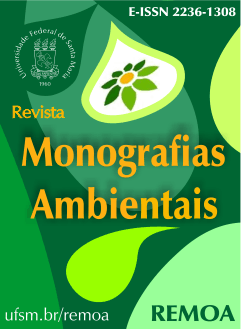Por uma educação planetária: produzindo sentidos e significados às práticas pedagógicas na educação infantil
DOI:
https://doi.org/10.5902/223613087670Palavras-chave:
Educação infantil, Práticas pedagógicas, Educação AmbientalResumo
Este texto, desenvolvido no ano de 2010, apresenta uma experiência com uma turma de pré-escola na Unidade de Educação Infantil Ipê Amarelo, da Universidade Federal de Santa Maria. Elucida as possibilidades de trabalho com a Educação Ambiental na Educação Infantil, tendo em vista a construção de práticas pedagógicas pensadas para e com as crianças. Nessa proposta a criança é participante ativa dos processos pedagógicos. O professor, por sua vez, exerce o papel de mediador, articula os conhecimentos da realidade das crianças aos conhecimentos científicos, o que as favorece na ampliação de suas percepções sobre o ambiente do qual fazem parte, e em relação as interrelações que acontecem nesse ambiente, construindo um olhar observador, crítico e de cuidado sobre a vida no Planeta Terra.
Downloads
Referências
BARBOSA, M. C. S.; HORN, M. da G. S. Projetos na educação infantil. Porto Alegre: Artmed, 2008.
BRASIL, Ministério da Educação. Diretrizes Curriculares Nacionais para a Educação Infantil. Secretaria da Educação Básica, Brasília; MEC, SEB, 2010.
CONELL, J. Vivências com a Natureza. São Paulo: Aquariana, 2008.
LUZ, I. R. da. Relações ente crianças e adultos na educação infantil. In: Anais do I Seminário Nacional: currículo em movimento- perspectivas atuais, Belo Horizonte, novembro de 2010.
MELLO, S. A.; FARIAS, M. A. A Escola como lugar da cultura mais elaborada. In: Revista do Centro de Educação (UFSM), Santa Maria, V. 35, n.1, jan./abr. 2010.
WARD, H.; RODEN, J. As habilidades que os alunos devem ter para aprender ciência: habilidades processuais. In: W,H,...[et al.]. Ensino de Ciências. Porto Alegre: Artmed, 2010.
SCHIEL, D; ORLANDI, A. S. & RUFINO, S. F. (Org.) Explorações em ciências na educação infantil. São Carlos, SP: Compacta Gráfica e editora Ltda, 2010.
TIRIBA, Léo. Crianças da Natureza. In: Anais do I Seminário Nacional: currículo em movimento- perspectivas atuais, Belo Horizonte, novembro de 2010.
Downloads
Publicado
Como Citar
Edição
Seção
Licença
Ethical guidelines for journal publication
The REMOA is committed to ensuring ethics in publication and quality of articles.
Conformance to standards of ethical behavior is therefore expected of all parties involved: Authors, Editors, Reviewers, and the Publisher.
In particular,
Authors: Authors should present an objective discussion of the significance of research work as well as sufficient detail and references to permit others to replicate the experiments. Fraudulent or knowingly inaccurate statements constitute unethical behavior and are unacceptable. Review articles should also be objective, comprehensive, and accurate accounts of the state of the art. The authors should ensure that their work is entirely original works, and if the work and/or words of others have been used, this has been appropriately acknowledged. Plagiarism in all its forms constitutes unethical publishing behavior and is unacceptable. Submitting the same manuscript to more than one journal concurrently constitutes unethical publishing behavior and is unacceptable. Authors should not submit articles describing essentially the same research to more than one journal. The corresponding author should ensure that there is a full consensus of all co-authors in approving the final version of the paper and its submission for publication.
Editors: Editors should evaluate manuscripts exclusively on the basis of their academic merit. An editor must not use unpublished information in the editor's own research without the express written consent of the author. Editors should take reasonable responsive measures when ethical complaints have been presented concerning a submitted manuscript or published paper.
Reviewers: Any manuscripts received for review must be treated as confidential documents. Privileged information or ideas obtained through peer review must be kept confidential and not used for personal advantage. Reviews should be conducted objectively, and observations should be formulated clearly with supporting arguments, so that authors can use them for improving the paper. Any selected referee who feels unqualified to review the research reported in a manuscript or knows that its prompt review will be impossible should notify the editor and excuse himself from the review process. Reviewers should not consider manuscripts in which they have conflicts of interest resulting from competitive, collaborative, or other relationships or connections with any of the authors, companies, or institutions connected to the papers.






